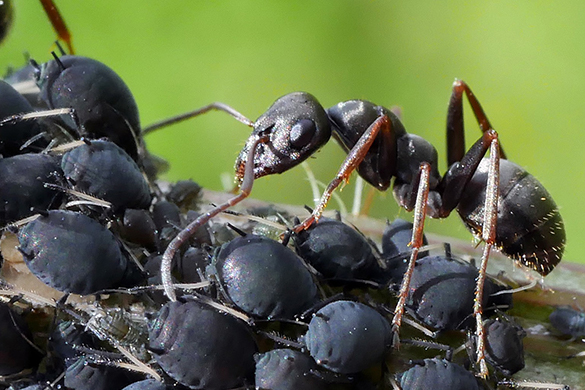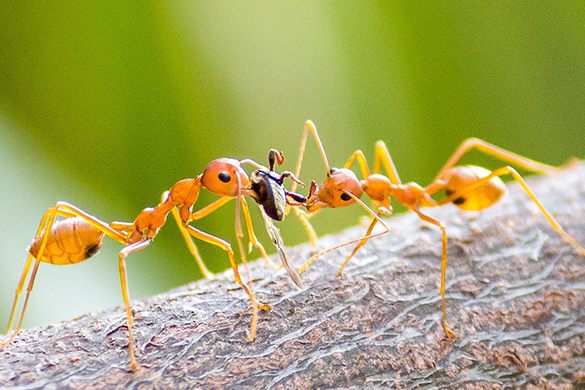Avoid becoming the target of an angry ant colony thriving in your garden. Knowing how to get rid of ants in your garden will help you do your gardening duties without worrying about irritating ant bites and stings.
homeandgardeningguide.com gathered the following information and tips on how to eliminate ants in your garden.
Why Do I Have A Lot of Ants in My Garden?

It is normal to have ants occasionally foraging through your garden. That stated, when they move their colony to your garden and become a nuisance, it is typically a sign of more significant problems. Ants are attracted to the following:
Sap Farming – Ants will cultivate and protect mealybugs, scales, whiteflies, leafhoppers, and aphids, and the sweet bi-product they produce when feeding on your plants.
Anything Sugary or Sweet – Ants have a keen sense of smell. They are attracted to candy, scented foods, carbohydrates, sugary drinks, scented candles, perfume, nuts, seeds, fruit, flower nectar, and anything that may satiate their sweet craving.
Pheromone Trails – Ants use pheromones to mark their paths, helping other colony members efficiently get from the nest to a food source and back again.
What Kills Ants Instantly in the Garden?
Before resorting to harsh commercial pest control sprays and chemicals, try these three safer extermination methods:
Cornmeal and Baby Powder – A few handfuls of cornmeal or baby powder on ant mounds can prove effective in eradicating ants.
Borax – Borax placed in containers mixed with jelly will attract and kill ants. Ants cannot digest borax and will quickly die, taking many colony members with them.
Note: Borax can be toxic to wild animals and pets, so use it judiciously.
Diatomaceous Earth – Diatomaceous earth comes from dead sea creatures called diatoms and is available at almost any garden center or nursery. The granules’ sharp edges kill ants and other insects as they try to digest them.
Tip: Diatomaceous earth needs to stay dry to be effective. Re-apply it after rain or watering.
Vinegar – A 1-to-1 mixture of vinegar and water is often sufficient to ward off small numbers of ants when sprayed over their pheromone trail and ant hill.
Neem Oil – Another natural way to eliminate ants in your garden is to eliminate their food source. Spraying your plants with neem oil (foliage top and bottom) will help eliminate scale, mealybug, whitefly, leafhopper, and aphid infestations, effectively cutting off one of the principal food sources helping ants thrive. Neem oil will also irritate and discourage ants from nesting in your garden.

Should I Get Rid of Ants in My Garden?
While ants can be a menace (especially in great numbers), consider how they help create healthy ecosystems:
- Ants eat fleas, caterpillars, termites, and dead remains of insects and animals.
- Ants aerate the soil
- Ants dig extensive tunnels that carry water, oxygen, and nutrients to plant roots
- Ants accelerate the decomposition of organic material, like leaves and dead insects, thereby enriching the soil and fertilizing plants
Note: Ants can displace approximately the same amount of soil as earthworms, loosening the soil while enriching it.
How Do Ants Damage Vegetable Gardens?
Ants cause the most damage to young, tender plants and can be especially damaging to the following crops:
- Corn
- Cucumbers
- Okra
- Potatoes
- Watermelon
Use extreme caution if you choose to apply chemical (commercial) repellants. These substances can infiltrate your soil and be absorbed by your plants. It is highly recommended to apply non-toxic solutions, like cornmeal, baby powder, borax, diatomaceous earth, vinegar, and neem oil.
Tip: Treat your surrounding lawn with ant baits and deterrents as well to prevent new ant colonies from invading your vegetable garden.
Treat ant infestations quickly and early, as the longer you wait, the harder they become to exterminate and the more plant damage they cause.
Getting Rid of Fire Ants Naturally

Fire ant colonies can reach massive proportions, cause severe garden damage, and inflict painful stings when attacking unwitting passersby. Here is how you can quickly and naturally eradicate them from your garden:
Step 1 – Mix 1 tablespoon of liquid dish soap or ¼ cup Castile soap with a quart of water
Step 2 – Poke a large and deep hole in the top of the fire ant mound
Step 3 – Slowly pour the soapy water mixture into the mound
Step 4 – Put the remaining soapy water solution in a spray bottle to spray the ants you see outside the nest
Tip: Add cooking oil to your soapy water solution, and the oil will suffocate the ants.
Note: Soap decomposes the protective wax coatings that fire ants use to retain water. Without their exoskeleton, ants quickly dehydrate.
Eliminating Ants in Your Garden
In this article, you discovered essential information and tips on how to safely get rid of ants in your garden.
Getting rid of ants in your garden can prevent damage to young, tender plants and help you avoid painful bites and stings from aggressive colonies.
Ignoring ants in your garden can result in significantly damaged plants, severe attacks on pets, unsuspecting children, and yourself.
Sources:
hgic.clemson.edu/factsheet/controlling-fire-ants-in-the-vegetable-garden/
nwdistrict.ifas.ufl.edu/hort/2016/08/12/fire-ants-in-the-garden/
pestadvisories.usu.edu/2020/05/15/ants-in-the-garden-cold-damage-vs-disease-aphid-movement-in-the-landscape/
extension.psu.edu/programs/master-gardener/counties/clinton/news/2015/ants-friend-or-foe
Visit http://www.homeandgardeningguide.com/gardening-landscaping/maintenance/ for more garden maintenance articles, resources, DIY and how-to tips.
The post How To Get Rid of Ants in the Garden appeared first on http://www.homeandgardeningguide.com
No comments:
Post a Comment